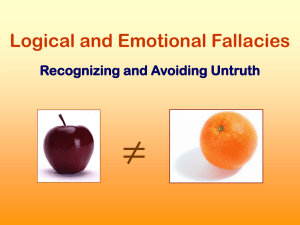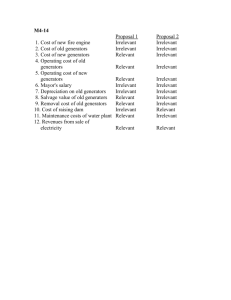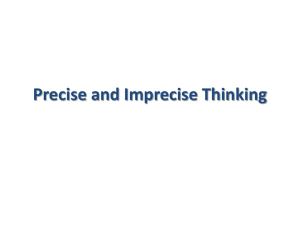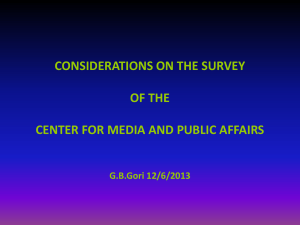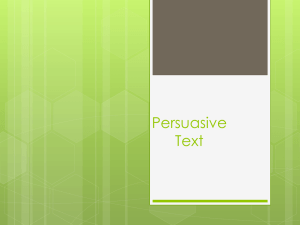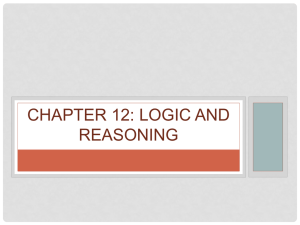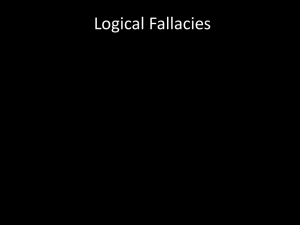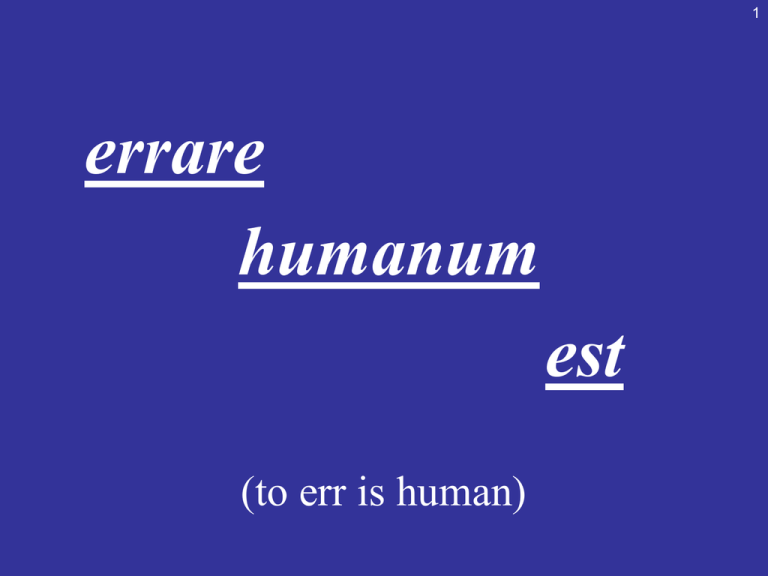
1
errare
humanum
est
(to err is human)
FALLACIES
PART 1:
INDUCTION
vs.
DEDUCTION
4
INDUCTION
(S G)
• think “increase” (induction, increase)
• from specific/particular instance or instances
• to generalization
• quantity: (#) sufficient # of items or people asked,
sufficient data (stats)
• quality: reliable source (authority), accurate & in-depth
observation
*PROBABILITY, not certainty*
5
INDUCTION
BAD EXAMPLE:
• You compare the prices of 4 textbooks at store #1 with
those at store #2 and notice that the prices are higher at
the former than at the latter. You conclude that store #1
is more expensive.
6
INDUCTION
GOOD EXAMPLE:
• A television documentary focuses on the issue of unwed
teenage mothers in a particular city neighborhood. Four
girls are interviewed and followed for several days.
Then, a noted and respected sociologist who has studied
thousands of unwed teenagers is interviewed, and she
claims these four girls are representative of the many.
7
INDUCTION
*INDUCTIVE FALLACIES:
• wrong use of data—
– insufficient sample (not enough people interviewed)
– ignore evidence (other possibilities)
8
DEDUCTION
(G S)
• think “decrease” (deduction, decrease)
• from inductive generalization
• to conclusion
9
DEDUCTION
3 Propositions of a Deductive Syllogism
• 1) MAJOR PREMISE:
– inductive generalization
– “All”
– All humans are mortal.
*(“syllogism”: Greek, to calculate using logic)*
10
DEDUCTION
3 Propositions of a Deductive Syllogism
• 2) MINOR PREMISE:
– statement about a specific member of that group
– “This”
– My English professor is a human.
11
DEDUCTION
3 Propositions of a Deductive Syllogism
• 3) CONCLUSION:
– Major Premise + Minor Premise = Conclusion
•1+2=3
• S G, G S
– “Therefore”
– Therefore, my English professor is mortal.
12
DEDUCTION
• If the MAJOR premise = absent or faulty induction,
• if the MINOR premise = faulty observation concerning
the individual at issue,
• then conclusion = faulty, invalid.
• HOWEVER, if the opposite is true, then the conclusion
is a valid, strong one — stronger than induction.
*CERTAINTY, validity, truth*
13
DEDUCTION
*BAD EXAMPLE:
• A man is sitting opposite you on a train. He has what
appears to be chalk dust on his fingers, and you
conclude that he is a teacher.
14
DEDUCTION
*BAD EXAMPLE:
• Major premise = “All men with chalk on their fingers
are school teachers.”
• Minor premise = “This man has chalk on his fingers.”
• Conclusion = “Therefore, this man is a school teacher.”
15
DEDUCTION
*BAD EXAMPLE:
• Faulty Conclusion:
– other occupations:
• draftsmen, carpenters,
• tailors, artists
– other powders:
• flour, confectioner’s sugar,
• talcum, heroin
16
DEDUCTION
*DEDUCTION & your INTRODUCTORY PARAGRAPH
•
•
•
•
“Funnel Effect,” “Inverted pyramid”
G S,
syllogism, conclusion of syllogism = thesis statement
Major premise = “Reducing awareness of social
differences is a desirable goal for the school.”
• Minor premise = “A uniform dress code would help to
achieve that goal.”
• Conclusion/thesis = “Therefore, students should be
required to dress uniformly.”
17
DEDUCTION
*DEDUCTIVE FALLACIES:
• failure to follow the logic of a series of statements
• an error in one premise or both premises
• other possibilities exist that were not taken into
consideration
• reliance upon support other than facts
18
PART 2:
FACTS
vs.
IMPLICATIONS, ASSUMPTIONS,
INFERENCES
*OCCAM’S RAZOR*
19
FACTS vs. OTHERS
1) FACTS:
• provable, verifiable *
• probable
• primary evidence:
– senses
– science
• secondary evidence:
– testimony = secondary (beliefs, ideas not from senses)
– historical evidence (documents, testimony, articles)
20
FACTS vs. OTHERS
2) IMPLICATIONS:
• unspoken message
• suggestion
• with indirect words
* SUBTEXTS
* Rhetorical Questions, Mincing Words
21
FACTS vs. OTHERS
3) ASSUMPTIONS:
•
•
•
•
supposition
idea taken for granted
based on prior knowledge
based on little knowledge
22
FACTS vs. OTHERS
4) INFERENCES:
• logical deduction
• based on evidence or observation
• educated guess
23
FACTS vs. OTHERS
• ASSUMPTION vs. INFERENCE:
– assumption = based on belief
– inference = based on sense data or premises
• IMPLICATION vs. INFERENCE:
– implication = made by the speaker
– inference = made by the listener
24
FACTS vs. OTHERS
*Implications, Assumptions, Inferences:
•
•
•
•
•
not = facts
you fill in the gaps
you make connections
you supply missing data
you draw conclusion without all of the information/facts
25
OCCAM’S RAZOR
*RULE OF SIMPLICITY: (in textbook)
• When there are competing possibilities, choose the
answer that requires the fewest assumptions.
• “Cut” through the obfuscation (BS) and choose the
solution that would not appear on The X-files .
*The simplest solution
is often the best.
PART 3:
THE FALLACIES
26
27
I. INSUFFICIENT
EVIDENCE
28
INSUFFICIENT EVIDENCE
• FAULTY INDUCTION: Inductive Fallacies
– quantity: not enough evidence upon which to draw a
reasonable conclusion
– quality: unreliable data or sources
• bad Ethos
• implications, assumptions, inferences (not facts)
• FAULTY DEDUCTION: Deductive Fallacies
– flawed Major Premise (generalization)
– flawed Minor Premise (specific, observation)
29
INSUFFICIENT EVIDENCE
1) OVERGENERALIZATIONS:
•
•
•
•
hasty, false, sweeping generalizations
dicto simpliciter (spoken simply)
implies ALL
uses INDEFINITE PRONOUNS:
– all, everyone, everybody
– no one, nothing
– everything, anything, always
30
INSUFFICIENT EVIDENCE
1) OVERGENERALIZATIONS:
• EASILY DISPROVED: too many exceptions
and too many complications (life = too complex)
• QUALIFY WITH:
– many, some, few
– usually, often, in my experience
• DANGER with qualifying: too many maybe’s in your
writing may make you look indecisive
31
INSUFFICIENT EVIDENCE
*EXAMPLES of OVERGENERALIZATIONS:
• *stereotypes, prejudices, superstitions:
– racism, ageism, sexism
– “Teenagers today are fat and lazy.”
– “Men don’t cry.”
• Hasty generalization: “Jim Bakker was an insincere Christian.
Therefore, all Christians are insincere.”
• Sweeping generalization: “Christians generally dislike atheists.
You are a Christian, so you must dislike atheists.” (senior citizens,
Asians, guys, Americans = materialistic, war-mongers)
32
INSUFFICIENT EVIDENCE
2) STACKING the DECK (a.k.a. “card stacking”):
• poker metaphor:
– dealing yourself a good hand;
– stacking the card deck in your favor
• selecting only the data that supports your position
• ignoring contradictory data
– (only 1 side of the issue)
– (*needs other side/s of the issue)
• news bias, politicians, tobacco/oil industries
• fraudulent, misleading
33
INSUFFICIENT EVIDENCE
*EXAMPLES of CARD STACKING:
• “Ninety-five percent of the people I interviewed agreed
with the Democratic Opposition.”
• BUT I only interviewed people at the Democratic
National Convention!
• “According to a Left-Wing Nut magazine poll, the Vice
President has a low approval rating.”
• BUT only those people who read—i.e., agree with the
ideology of—this publication were polled.
34
INSUFFICIENT EVIDENCE
3) AD IGNORANTIUM:
• since cannot disprove (or prove), then must be true
• assumes a lack of information (“ignorance”) is a source
of information (*needs more info)
• yet, an absence of evidence is not evidence
35
INSUFFICIENT EVIDENCE
• CARD STACKING vs. AD IGNORANTIUM:
– Don’t be fooled by the “ignoring” part –
• CS: purposefully ignores existing evidence
data that will disprove or weaken that side
the data does exist but is ignored
• AI: uses ignorance as evidence
uses the lack of existing evidence as evidence
the lack of evidence = the proof
the data does not exist
36
INSUFFICIENT EVIDENCE
*EXAMPLES of AD IGNORANTIUM:
• “Since the library has no books on Eva Braun’s intimate
relations with Adolf Hitler, then she must not have had
any.”
• “Of course the Bible is true. Nobody can prove
otherwise.”
• “Of course telepathy and other psychic phenomena do
not exist. Nobody has shown any proof that they are
real.” (aliens, ghosts)
37
INSUFFICIENT EVIDENCE
4) POST HOC ERGO PROPTER HOC:
• “after this, therefore b/c of this”
• assumes a causal relationship;
– no other explanations
– faulty Cause-Effect relationship
• assumes a later event was caused by an earlier one
– simply because of chronology
– *needs more info, more research
• B follows A; therefore, A causes B
38
INSUFFICIENT EVIDENCE
• DISPROVE with: (more information)
– prove A and B are merely coincidences
– show how A is merely 1 cause of many
– show how A is not even a significant cause of the many
• *more than 1 cause of an effect, more than 1 effect of a cause
• indirect and direct causes
• complexity of life, of situations
– OCCAM’S RAZOR:
• simpler, more credible answer or explanation is best
39
INSUFFICIENT EVIDENCE
• PHEPH: Superstitions
• <boston.com >
40
INSUFFICIENT EVIDENCE
*EXAMPLES of P.H.E.P.H.:
• superstitions, astrology
• Consider additional causes for the following:
• “Because you left the milk out last night, it was spoiled
this morning.”
• “The Soviet Union collapsed after instituting state
atheism. Therefore, we must avoid atheism for the same
reasons.”
• “A rooster crows every morning, and shortly after, the
sun rises. Therefore, the rooster causes the sun to rise.”
41
INSUFFICIENT EVIDENCE
*EXAMPLE of P.H.E.P.H.:
• “After the school principal suspends daily prayers in the
classroom, acts of vandalism increase, and some parents
are convinced that the failure to conduct prayer is
responsible for the rise in vandalism.”
• But…decline in disciplinary actions, a relaxation of
academic standards, a change in school administration,
changes in family structure in the school community.
42
INSUFFICIENT EVIDENCE
Post hoc ergo propter hoc:
• after this (subsequency), therefore because of this
Cum hoc ergo propter hoc:
• with this (synchronicity), therefore because of this
– mistakes a correlation for causation
– overlooks coincidence, others causes
– because of simultaneous occurrence
– “Clinton had great economic policies because the
economy was great during his two terms.”
43
INSUFFICIENT EVIDENCE
5) AD HOC:
1 time only!
• “for this (specific purpose)” – “impromptu, provisional”
• an after-the-fact explanation
• does not apply to other situations (for this special case alone)
• “God cured me of my cancer.” “But most patients with brain
cancer die. Why did She save you? Are you special? Does She
love you more than the rest of us?” “She moves in mysterious
ways.”
– because God treats all people equally, no special treatment
– refuted by more evidence (radiation, medication, remission)
– see also God & war, God & sports
44
INSUFFICIENT EVIDENCE
6) The Natural Law Fallacy -- Appeal to NATURE:
• draws a false analogy between the human and natural
worlds
• assumes that humans are part of the natural world
(animals) and should thus mimic “animalistic” behavior
• assumes that whatever is “natural” or consistent with
“nature” is good AND that whatever is “unnatural” is
bad
– supplements, herbal remedies
– “law of the jungle” arguments for genocide, capitalism
– “Homosexuality is natural because monkeys have been
observed engaging in homosexual behavior.” (or the opposite)
45
INSUFFICIENT EVIDENCE
6) The Natural Law Fallacy -- Appeal to NATURE:
• BUT
– “natural” and “nature” = poorly defined
– just because animals do it (or don’t) does not mean
humans should (or shouldn’t) do so automatically,
necessarily, unquestionably
– naïve environmentalism
– poison ivy, Ebola, climate, eat their young, eat bugs
– bathrooms, plumbing, fire, literature, clothes, utensils
46
II. IRRELEVANT
INFORMATION
47
IRRELEVANT INFORMATION
DIVERSIONARY TACTICS
• They introduce ideas that are off-topic.
• Their data is NOT germane to the present case.
Diversions, Distractions
from the argument at hand
48
IRRELEVANT INFORMATION
1) AD BACULUM:
• intimidation
• threat of harm:
– physical or psychological *
– economical, political, environmental
• extortion, blackmail
– Rather than make a claim, point, or counter-argument, I
make a threat, which isn’t discussing the issue at hand.
– Because my evidence is rather weak, I try to win the
argument with a “scare tactic.”
49
IRRELEVANT INFORMATION
*EXAMPLES of AD BACULUM:
• “If citizens don’t start patronizing downtown stores, then
businesses will be forced to close and then the city will be in
ruin.”
• “If you don’t (believe in God, convert to our religion,
illegalize that practice), then you’ll burn in Hell!
• “... In any case, I know your phone number and I know
where you live. Have I mentioned I am licensed to carry
concealed weapons?”
• “If we make abortions illegal, women will be getting
butchered again in back alleys.” (ad misericordiam, slippery
slope)
50
IRRELEVANT INFORMATION
2) AD HOMINEM:
•
•
•
•
•
*name calling
(think hombre, hommé)
personal attack, insults
attack the person, not the facts or issue
a way to avoid dealing with the issue (*diversion)
51
IRRELEVANT INFORMATION
*PLEASE NOTE*
• A bad person does not necessarily mean a bad argument
(conclusion, point).
– (even a broken clock…)
• Accusations against the person are NOT a fallacy IF the
characteristics under attack are relevant to the
argument.
– For example, if a politician is irresponsible &
dishonest in her/his personal life, then it is reasonable
to think that s/he may be the same in public office.
52
IRRELEVANT INFORMATION
*EXAMPLES of AD HOMINEM:
• “What does he know; look at the way he’s dressed.”
• “What can a priest tell us about marriage since he’s
never been married himself.” (AA)
• “My doctor is overweight, so why should I listen to
anything he has to say.” (Dr. Adkins)
• “I won’t see a Jayne Smith movie because she’s a drug
addict.” (private life vs. professional record)
• “Since you don’t support gay marriages, you must be a
homophobe.” (racist, sexist)
53
IRRELEVANT INFORMATION
*EXAMPLES of AD HOMINEM:
• “You claim that atheists can be moral — yet I happen to
know that you abandoned your wife and children.”
• “Hitler would be very proud of you” (in response to
practically any conclusion or decision).
• “Therefore, it is perfectly acceptable to kill animals for
food. I hope you won’t argue otherwise, given that
you're quite happy to wear leather shoes.”
• “Of course you’d argue that positive discrimination is a
bad thing. You’re white.”
54
IRRELEVANT INFORMATION
3) FALLACY of OPPOSITION:
• *name calling
• whatever comes from the opposition is automatically
wrong AND detrimental
• assumes nothing good could come from those we oppose
• Us vs. Them
• EXAMPLE: “Of course you’d say that, you’re an
atheist, hippie, teenager, Democrat ….” (a member of
the opposing group)
55
IRRELEVANT INFORMATION
4) GENETIC FALLACY:
• *name calling
• assumes where the idea came from affects its validity
(country, paper, school)
• akin to elitism, snobbery
• we come from our genes,
– genes genetic fallacy
56
IRRELEVANT INFORMATION
4) GENETIC FALLACY:
*EXAMPLES:
• “The quality of those products is poor because they
come from China (any country).”
• “Cars made in the USA (any country) are junks.”
• “Because that idea comes from a community college it
must be flawed, erroneous, or just plain wrong.”
57
IRRELEVANT INFORMATION
5) GUILT by ASSOCIATION:
• birds of a feather stick together
• assumes a person’s behaviors must extend to their
friends, to those around them
*EXAMPLES:
• “Everyone who goes into a bar is an alcoholic.”
• “Sally’s promiscuous, so as her friend you must be, too.”
58
IRRELEVANT INFORMATION
6) AD MISERICORDIAM:
• an abuse of pity
• manipulation & obfuscation (*diversion)
• irrelevant
– evoke pitiful image or situation, without basis, to
distract from the issue
• relies wholly on pity (pathos)
59
IRRELEVANT INFORMATION
*EXAMPLES of AD MISERICORDIAM:
• photos of kids: war, famine, AIDS, disaster
• “I couldn’t write my paper because my son, daughter,
mother, girlfriend, neighbor down the street was sick.”
• “I did not murder my mother and father with an axe!
Please don’t find me guilty; I’m suffering enough
through being an orphan.”
60
IRRELEVANT INFORMATION
7) AD POPULUM:
• appeals to the “populace”
• biases & prejudices, appeals to tradition,
• halcyon days
• tells people what they want to hear, what they want to believe
(“working the audience”)
• SLOGANS and SOUND BITES subvert the reasoning process
because they do not define terms
– which can mean whatever people want them to mean or
– whatever people say they mean
• what exactly are “family values”?!
61
IRRELEVANT INFORMATION
*EXAMPLES of AD POPULUM:
• sound bites, slogans, bumper stickers, tee shirts
• appeals to patriotism, change for change’s sake
• political cartoons, late-night-TV monologues or punch lines,
Comedy Central shows
• if it appears on poster, tee shirt, bumper sticker
• “If guns are outlawed, then only outlaws will have
guns.”
• “Zippo. It’s the grand old lighter that’s made right
here in the good ol’ USA.…” (patriotism)
• “Freedom isn’t free.” “No blood for oil.”
• “Guns don’t kill people; people kill people.”
• “Just say no.”
62
IRRELEVANT INFORMATION
8) BANDWAGON:
•
•
•
•
Argumentum ad numerum
right/valid because popular
jump on the bandwagon, join the parade
do because others do: peer pressure, group/mob
identity, conformity
• appeals or refers to NUMBERS
• BUT you can be correct even if no one else agrees with
you (Copernicus, Columbus)
63
IRRELEVANT INFORMATION
*EXAMPLES of BANDWAGON:
#
• “Sixty million people can’t be wrong.”
• “Over 5 million Americans have already switched to
Grizzly Insurance.”
• “Last December, over 100 million people worldwide
tuned in to see a television phenomenon: don’t be left
out when Knucklehead TV returns in March.”
• “Everybody’s doing it anyway, so we might as well
legalize it (lower the age).”
64
IRRELEVANT INFORMATION
• *Similar to: Argumentum ad numerum AND to Argumentum ad
populum. It consists of asserting that the more people who
support or believe a proposition, the more likely it is that that
proposition is correct. For example:
– “The vast majority of people in this country believe that
capital punishment has a noticeable deterrent effect. To suggest
that it doesn’t in the face of so much evidence is ridiculous.”
Or “All I'm saying is that thousands of people believe in
pyramid power, so there must be something to it.”
• *Similar to: Appeal to Tradition: right/valid because it’s old;
since it’s lasted this long, it should continue. ex: “Since the Fiesta
Club has been an exclusive male-only society since its founding at
the turn of the 20th century, it should continue to exist in the same
manner & form.”
65
IRRELEVANT INFORMATION
9) PLAIN FOLKS and SNOB APPEAL:
• right because popular
– opposite of the Genetic Fallacy
• These are 2 different fallacies, but same “coin.”
• Plain Folks Appeal: do because the ordinary person
does (& avoid the pretensions of snobs)
• Snob Appeal: do because rich/popular/beautiful do
(*celebrity endorsements)
66
IRRELEVANT INFORMATION
*EXAMPLES of PLAIN FOLKS & SNOB APPEAL:
• “Why pay fancy salon prices for a shampoo?”
• “Family values will return America to world prominence.”
• “Mark Twain said, ‘The clothes make the man. Naked people
have little or no influence on society.’ So, if you want to be a
winner, you’ve got to look like a winner, which means you need a
Rolex watch, Italian shoes, and a Lexus to be successful.”
• “Use the deodorant that professional athletes like Illiterate Joe
use.” (appeals to reader’s vanity)
• Think of 2 diametrically opposed musical genres.
• also known as: Argumentum ad lazarum: The fallacy of assuming that someone
poor is sounder or more virtuous than someone who's wealthier. This fallacy is
the opposite of the Argumentum ad Crumenam. For example: “Monks are
more likely to possess insight into the meaning of life, as they have given up the
distractions of wealth.”
67
IRRELEVANT INFORMATION
10) AD VERECUNDIAM:
• inappropriate use of authority
• assumes because a person is an expert in one field that
s/he is an expert in another (*celebrity endorsements)
OR
• the use of an obscure, hard to find source
• poor or irrelevant credentials, wrong field of expertise,
no Other Side of the issue (Rogerian Method)
*BAD ETHOS*
68
IRRELEVANT INFORMATION
*EXAMPLES of AD VERECUNDIAM:
Bad:
• “I play a doctor on TV, so take this new OTC pill.”
• “Isaac Newton was a genius and he believed in God, so you
should, too.”
• “Dr. Housenick claims stem cell research for the development
of cures for various diseases is (is not) a worthy venture.”
• “Because my parents were unavailable, I asked my English
teacher for permission to stay out late.”
Good:
• “Dr. Stephen Hawking has concluded that black holes give off
radiation; therefore, there is a strong chance that they exist.”
69
IRRELEVANT INFORMATION
11) RED HERRING:
• *diversion
• skirt the issue; obfuscate the truth
• use an irrelevant point or a side issue to lead away from
the issue at hand
70
IRRELEVANT INFORMATION
*EXAMPLES of RED HERRING:
• “Sure, the Chargers had a bad year, but what about the
Redskins.”
• “While it may be true that we withheld vital information
from the public regarding the dangerous side effects of
our products, while it may be true that we sought ways
to enhance our products with addictive substances, and
while it may be true that we profited immensely from all
this, have you taken into consideration the fact that we
have given bottled water to disaster victims and other
acts of community involvement?”
71
IRRELEVANT INFORMATION
12) STRAWMAN ARGUMENT
• a.k.a. Weak Opponent, Scarecrow Argument
• *diversion, name calling
• this one has a few different (yet related) sides to
it:
72
IRRELEVANT INFORMATION
1. Use or invent a convenient opponent that can be
attacked (or applauded) without fear of
retaliation
–
–
an easy target
to show how “strong” you are, you hold up a
Scarecrow & slap it around (think WWE)
– I can make fun of famous people because
there’s little chance that they’ll come
from Hollywood (e.g.) to rebut me.
• think of these easy targets:
• Britney Spears, KKK, Nazis
73
IRRELEVANT INFORMATION
2. Use or invent a generic/vague group or label
– *no real person involved
– no true subject of the argument is identified
– label = unfair, inaccurate, manufactured solely for
the argument
– stereotypes, overgeneralizations
(*based on personal biases/prejudices)
– *could be positive group:
• the heroic war dead, brave immigrants
• (*no specific person indicated)
74
IRRELEVANT INFORMATION
3. *Attack your opponent’s weakest possible
argument, one s/he is not even offering
–
–
–
put words into the opponent’s mouth **
similar to #1, in that I set up an easy opponent (their
weakest possible argument) just so I can easily
knock it down (and look good in the process)
like: Tu Quoque, Ad Hoc, False Dilemma
75
IRRELEVANT INFORMATION
*EXAMPLES of STRAWMAN:
• Richard Nixon’s 1952 Checkers speech (weakest possible
argument)
• “kids/students today” (no real kid/student)
• “moral majority” (who are these people?)
• “welfare cheats” (do they really exist?)
• “liberal media” (is it really? all? proof?)
• “To be an atheist, you have to believe with absolute certainty that
there is no God. In order to convince yourself with absolute
certainty, you must examine all the Universe and all the places
where God could possibly be. Since you obviously haven't, your
position is indefensible.” (weakest argument)
76
IRRELEVANT INFORMATION
13) TU QUOQUE: (too kwo-kway)
• “you did it too”
• justify actions because accusers are supposedly guilty of
same crime
• 2 wrongs make 1 right (see AD POPULUM)
77
IRRELEVANT INFORMATION
*EXAMPLES of TU QUOQUE:
• “You did it too when you were my age.”
• quote: “It’s ok that I dis white people on my show
because they’ve been doing it to us for years.”
• “How can you criticize my driving when you’ve had five
accidents yourself?”
• “Why shouldn’t I cheat on my taxes? Everyone else
does.”
78
IRRELEVANT INFORMATION
14) OVERSIMPLIFICATION:
•
•
•
•
•
like: Post Hoc, Overgeneralization
overlooks the complexity of an issue
*no critical examination of the issue
narrows complex issue down to single cause
BUT an issue has more than 1 side (more than 2 sides)
– legal, moral, religious, political, racial, philosophical...
• an effect always has more than one reason/cause
79
IRRELEVANT INFORMATION
*EXAMPLES of OVERSIMPLIFICATION:
• “Kids are fat because they eat too much McDonald’s.”
• “The only reason we’re at war with Iraq is over oil.”
– An ad populum statement may say, “No Blood for
Oil!”
• “It’s as simple as that.”
• “Today’s college students can’t spell because
of spellcheckers on computers.”
80
III. AMBIGUITY
81
AMBIGUITY
• These fallacies have statements that are either
purposefully or accidentally ambiguous, misleading, or
confusing.
• Their problem often lies with LANGUAGE:
– grammar
– punctuation
– diction
– syntax
82
AMBIGUITY
1) AMPHIBOLY:
•
•
•
•
a.k.a. “amphibole”
Latin for “ambiguous”
ambiguous, multiple meanings or interpretations
caused by Bad Grammar
– misplaced modifiers, poor pronoun reference
• misleading statistics
– percentages: 89% sounds like much, but not if only 5
people were asked
83
AMBIGUITY
*EXAMPLES of AMPHIBOLY:
• “Her parents watered the flowers, yet they died.”
(confusing PN reference)
• “Sam gave Bob his baseball glove.” (confusing PN
reference)
• “I shot a bear in my pajamas.” (misplaced modifier)
• “March moved to June.”
• “Girl’s slip seen by many.”
• “4 out of 5 dentists prefer Trident.” (80%, only 5 asked)
84
AMBIGUITY
*EXAMPLES of AMPHIBOLY:
•
•
•
•
•
•
•
Blind Bishop Appointed to See
Patient at Death's Door — Doctors Pull Him Through
Teacher Strikes Idle Kids
Lawyers Give Poor Free Legal Advice
Juvenile Court to Try Shooting Defendant
Autos Killing 110 a Day — Let's Resolve to Do Better
Collegians are Turning to Vegetables
85
AMBIGUITY
2) BEGGING the QUESTION:
• *circular reasoning
• circulus in demonstrando or petitio principii
• avoidance, non-responsiveness
• restating the premise without answering the question
begs another question or other questions
• circular reasoning turns the question around without
answering it
• uses what is trying to be proved as part of the proof: the
proposition appears in the syllogism/proof
86
AMBIGUITY
2) BEGGING the QUESTION: (cont’d)
• “When is a fetus a person? When it is no longer a fetus.
When the doctor says so. When it has the attributes of a
person.”
– Answers beg other questions: When is it no longer a fetus?
When does a doctor say so? What are the attributes of a
person? When does a fetus acquire such attributes?
• Syllogism: It is wrong to kill innocent human beings.
Fetuses are innocent human beings. Thus, aborting
fetuses is wrong.
– “innocent” =?
– fetus=human being?
87
AMBIGUITY
*EXAMPLES of BEGGING the QUESTION:
• “My mother is a good person because she’s so moral.”
• “Homosexuals must not be allowed to hold government
office. Hence any government official who is revealed to
be a homosexual will lose his job. Therefore
homosexuals will do anything to hide their secret, and
will be open to blackmail. Therefore homosexuals cannot
be allowed to hold government office.”
• Petitio principii: “The Bible is the word of God. The
word of God cannot be doubted, and the Bible states
that the Bible is true. Therefore the Bible must be true.”
88
AMBIGUITY
3) EQUIVOCATION:
•
•
•
•
quibble on the meaning of word/s
a deliberate tactic to delay, distort, clutter, or avoid issue
trivial distinctions; euphemisms; misuse of definitions
obfuscates, obscures the real issue:
– “I didn’t steal your money; I merely borrowed it.”
– The issue is not about if you “stole” or “borrowed,”
but that you took the item without asking permission.
89
AMBIGUITY
*EXAMPLES of EQUIVOCATION:
• Knock, knock! Who's there, in the other devil's
name? Faith, here's an equivocator, that could
swear in both the scales against either scale;
who committed treason enough for God's sake,
yet could not equivocate to heaven: O, come
in, equivocator.
(from Macbeth 2.3.8-13)
• “That depends on what your definition of ‘is’ is.”
• “terrorists” or “freedom fighters,” “communist” or
“Marxist,” “refugee” or “illegal immigrant”
90
AMBIGUITY
4) LOADED LANGUAGE:
• biased words
• leading questions/statements, the answer to which is
misleading or damning
• readers should question users’ motives (ethos)
– they don’t want to consider the issue; they’ve already
made up their minds
– their questions are often statements
• sarcasm & irony = ambiguity (so avoid using either)
91
AMBIGUITY
*EXAMPLES of LOADED LANGUAGE:
• “Do I have to research any more junk on this stupid topic
for this worthless class?”
• “Concerning the inexperienced President’s hasty,
subvert, and ill-considered appointment of such an
incompetent and unproven judge, is this the type of
underhanded, thoughtless behavior we can expect from
this administration?”
• “Have you stopped beating your wife?”
92
AMBIGUITY
5) FALSE ANALOGY:
• false relationship, false comparison, false
impression
• more differences between the 2 than similarities
– (despite few superficial similarities)
• dig more and find that not related
– collapse when examined critically (difficult to use)
• exaggerations
• key words = “is like”
93
AMBIGUITY
*DESCRIPTIVE vs. EXPLANATORY:
• DESCRIPTIVE = metaphorical, more colorful than precise, remain dissimilar,
short cuts, not enough to support your claim
• “life is a bowl of cherries”
• Malcolm X, criticizing the participation of whites in the 1962 march on
Washington, DC: “It’s like when you’ve got some coffee that’s too black, which
means that it’s too strong. What do you do? You integrate it with cream, you make
it weak. But if you pour too much cream in it, you won’t even know you ever had
coffee.”
– Claim = integration of whites & blacks in the march weakened the black
movement for rights & jobs.
– Support = putting white cream into black coffee weakens the coffee.
– Warrant = weakening coffee with cream is analogous to weakening the
black rights movement by allowing white people to participate.
• Vivid & descriptive, but not convincing. Too many dissimilarities. “Strong” and
“weak” need to be defined. No facts, no proof, just racist opinion.
94
AMBIGUITY
• EXPLANATORY= more than imagery; offer facts, proof
• “In a world of nuclear overkill and redundance, the United States
and the Soviet Union are like two rivals locked in a small room in a
duel to the death where one has 1,400 pistols and the other 1,200.
The one with 1,400 has no advantage when one or both of the
parties are likely to be killed or maimed with the first pistol shot.”
– Claim = In enlarging their nuclear arsenals, the US and the
USSR are engaged in a duel that neither can win.
– Support = A duelist in a locked room with 1,400 pistols could
probably not win against a duelist with 1,200 pistols.
– Warrant = A pistol duel is analogous to the nuclear arms
rivalry between the US and the USSR. (still some
dissimilarities)
95
AMBIGUITY
*EXAMPLES of FALSE ANALOGY:
• “The Patriot Act turns our government into another
Reich.”
• Bush and Hitler
• 9/11 and Pearl Harbor
• Vietnam and Iraq 2003
96
IV. FAULTY
REASONING
97
FAULTY REASONING
• The problem with these fallacies
• lies in the logic
– the reasoning process
• rather than the data.
98
FAULTY REASONING
1) FALSE DILEMMA:
•
•
•
•
•
•
“either/or” thinking
HINT: the words “either/or” are often used
LIKE: Oversimplification, Loaded Language
assumes only 2 sides to an issue exist
both sides may be unpleasant, but 2nd usually is
BUT: more than 2 options, causes, sides to an issue
99
FAULTY REASONING
*EXAMPLES of FALSE DILEMMA:
• “You either support Feminism or you’re a sexist pig.”
• “Either man was created, as the Bible tells us, or he evolved
from inanimate chemicals by pure random chance, as scientists
tell us. The latter is incredibly unlikely, so...”
• “You are either for unilateral nuclear disarmament or for
nuclear war.”
• “In a 1975 interview, the Shah of Iran was asked why he could
not introduce into his authoritarian regime greater freedom for
his subjects. He replied, ‘What’s wrong with authority? Is
anarchy better?’ So, it’s either authoritarianism or anarchy.”
100
FAULTY REASONING
2) NON SEQUITUR:
• “it does not follow”
• Big Leap in logic, faulty conclusion, unconnected,
doesn’t make sense
• irrelevant information (like ad populum)
• A + B does not necessarily = C
• Faulty INDUCTION
– too big of a “leap” from the Specific to the General
101
FAULTY REASONING
*EXAMPLES of NON SEQUITUR:
• “Since half a million copies were sold & it was a best-seller for two
decades, it must be a great book.”
• “We don’t need books and libraries anymore because the Internet
has so much information.”
• “Since Egyptians did so much excavation to construct the
pyramids, they were well versed in paleontology.”
• “Since the President is away from the White House so often, the
Vice President must run the country.”
• “Since e-mail is so popular, we might as well stop making
envelopes, stamps, and paper.”
• “From the makers/producers/creators/director of the hit…”
• “From the team that brought you the hit…”
102
FAULTY REASONING
3) RATIONALIZATION:
•
•
•
•
•
rationalize
blame someone/thing else
self-serving excuse
flimsy justification
it’s not my fault; it’s yours
• We talk ourselves into something -- Do we ever
rationalize something good?
103
FAULTY REASONING
*EXAMPLES of RATIONALIZATION:
• “I can’t hand in my paper today because the dumb
computer wouldn’t print it.” (blame scapegoat, like
Scarecrow)
• “You can’t make an omelette without breaking a few
shells.” (blame virtue)
• “Yeah, I knocked over the garbage can, but you
shouldn’t have put it in my way.” (blame another)
• “It’s OK if I have another piece of cake; I’ll just go for a
run tomorrow.” (self-serving justification)
104
FAULTY REASONING
*EXAMPLES of RATIONALIZATION:
•
•
•
•
•
•
•
•
•
•
•
•
•
•
•
•
•
•
It’s only this one time.
OK, but this is the last time.
Just one more.
It’s Spring Break.
I’m away at college.
I’m an adult now.
No one will ever know.
My parents will never know.
Who’s ever going to see those pictures?
I needed the money.
It doesn’t hurt anybody.
It’s in the privacy of my own home.
I’m entitled:
– age, class, race
– I worked hard all week or semester.
It’s my life!
•
•
Everyone else is doing it. (like Tu
Quoque)
It’s on sale.
I’ll just cram the night before.
I’ll go out tonight and just study all day
tomorrow.
I’ll just….
CHEATING excuses:
– Everyone’s doing it.
– Look at the business world!
– The technology was made to help us
cheat.
– If the teacher were smart enough to
catch me cheating….
– The teacher grades on a curve, so I
have to cheat.
– I have to because of Affirmative
Action.
– I really need an A.
– It’s not my major.
105
FAULTY REASONING
*EXAMPLE from Blues Brothers:
• Jake: “Oh, please, don’t kill us. Please, please don’t
kill us. You know I love you baby. I wouldn’t leave
ya. It wasn’t my fault.
• Mystery Woman: You miserable slug! You think you can talk your
way out of this? You betrayed me.
• Jake: No I didn’t. Honest... I ran out of gas. I, I had a flat tire. I
didn’t have enough money for cab fare. My tux didn’t come back
from the cleaners. An old friend came in from out of town.
Someone stole my car. There was an earthquake. A terrible flood.
Locusts. IT WASN’T MY FAULT, I SWEAR TO GOD!
106
FAULTY REASONING
4) REDUCTIO AD ABSURDUM:
•
•
•
•
reduce to absurdity
use opponents’ reasoning against them
*extend their argument to its absurd conclusion
often employed to ridicule opponent
– sarcasm, ridicule
• similar, in this respect, to Straw Man
• also, based on the fallacious assumption that
more is better or that less is better
107
FAULTY REASONING
*EXAMPLES of REDUCTIO AD ABSURDUM:
• “If we allow a man to marry another man, then we
might as well allow him to marry a dog or a sheep.”
• “If 2 are good, then 5 are better, but then all of them
would be best.”
• “If 2 less is good, then 5 less would be better, but then
getting rid of them all would be best.”
• “Since my physical therapist told me to do 3 sets of 10
with my dumbbells, I should be cleared to play sooner if
I do 6 sets of 20; still, if I do 12 sets of 40, I’ll be
reactivated much sooner.”
108
FAULTY REASONING
5) SLIPPERY SLOPE:
• next step=danger/forbidden
• always ends badly (highway to hell)
• one thing must lead to another
– (1 drink/puff = addiction)
• dangerous proposals
• too simplistic, ignores the similarities, ignores the
complexity of life and institutions, ignores checks and
balances
109
FAULTY REASONING
* SLIPPERY SLOPE vs. REDUCTIO AD ABSURDUM:
• SS:
ends with something bad, but possible
• RAA: ends with something absurd, impossible
• Arguments against opening a casino:
– If we pass this referendum and allow this casino to open, then we’ll be
overrun by gambling addicts. (SS)
• one small steps, ends in something bad but possible
– If we pass this referendum and allow this casino to open, then we’ll be
overrun by zombies and demons. (RAA)
• ends with something absurd, impossible
• You want to open a casino in the area, so you’re pro-gambling. Because
you’re in favor of gambling, you must also be in favor of child
prostitution because that’s what gambling addicts force their children
into in order to feed their addiction.
110
FAULTY REASONING
*EXAMPLES of SLIPPERY SLOPE:
• “She kept her kid away from soda because one drink and he’d be
addicted to it for life.”
• “If we legalize marijuana, then more people would start to take
crack and heroin, and we’d have to legalize those too. Before long
we'd have a nation full of drug-addicts on welfare. Therefore, we
cannot legalize marijuana.”
• “Legalizing abortion will lead to murder of the elderly and the
physically and mentally handicapped.”
• “If we ban handguns, what’s next?! Rifles and other hunting
weapons?!”
• “If we allow gays to marry, then the human race will become
extinct.”
extras
112
extras
Argumentum ad antiquitatem: (appeal to antiquity or tradition)
• something (behavior, practice, policy) = right/acceptable because
of tradition
• “It's always been done that way.”
• “Every great civilization has believed in a higher power.”
Argumentum ad novitatem:
• opposite of the Argumentum ad Antiquitatem;
• something = better or more correct simply because it is new, or
newer than something else.
• “Windows XP is better than Windows 2003 because WXP just
came out."
113
extras
Argumentum ad nauseam:
• made to the point of disgust by repetition
• repetition to substitute for actual, real arguments, w/o
substantiation, w/o justification
Leading or loaded or complex question:
• no right way to answer; assumes something to be true by
its construction
• “Have you stopped beating your wife ?”
114
extras
Appeals:
•to Authority
•to Belief
•to Common Practice
•to Consequences of a
Belief
•to Fear
•to Flattery
•to Pity
•to Ridicule
•to Spite
•to SEX!!!
•Biased Sample
•Burden of Proof
•Ad Hominem Tu Quoque
•Circumstantial Ad
Hominem
•Composition
•Confusing Cause &
Effect
•Division
•Gambler's Fallacy
•Ignoring A Common
Cause
•Middle Ground
•Misleading Vividness
•Poisoning the Well
•Questionable Cause
•Relativist Fallacy
•Special Pleading
•Spotlight
•Two Wrongs Make A
Right
<http://www.nizkor.org/features/
fallacies/>

